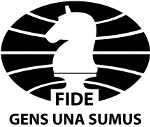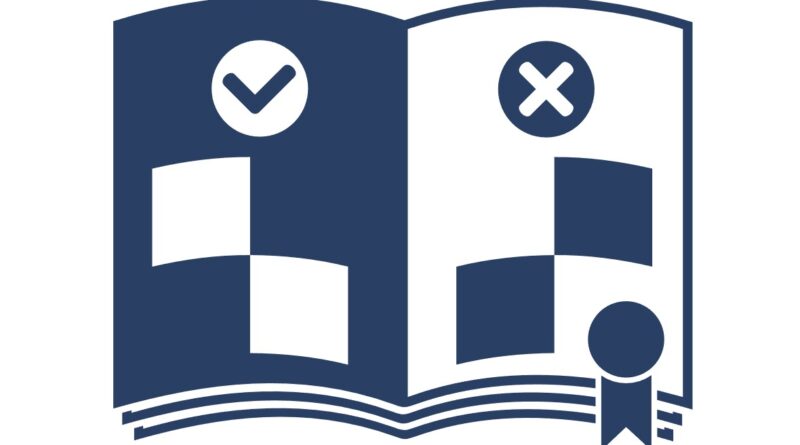Questions & Answers n. 4, November 2021 (Resignation and 75 moves-rule)
by IA Stéphane Escafre, FIDE rules commission
Elena Polovina is an International Arbiter from Russia. She is also a woman FIDE Master. Elena joined the FIDE Rules Commission and provided us with some tricky questions:
Dear Stephane,
First question.
Case: White has a King. Black has King + Queen. But Black resigns.
What is the arbiter’s decision? Can we accept his resignation or is it a draw?
Let’s think that it happened with kids, I just want to exclude any fair play case, any cheating possibility.
Here the philosophy of Arbiter’s decision is interesting.
If in this situation, Black loses on time, it is very simple and clear. According to Article 6.9 “…the game is drawn if the position is such that the opponent cannot checkmate the player’s king by any series of legal moves”. It would be a draw for both.
But if black resigns, we cannot use Article 6.9 because it says there “Except where one of the Articles … 5.1.2 (resign) applies…”
What do you think? What Article can we use to follow the letter of the law?
And the problem is that Article 5.1.2 states very clearly, that it is a loss: “The game is won by the player whose opponent declares he resigns. This immediately ends the game”
Well, I agree that it is a draw for both, but I am just interested in the explanation.
Stéphane Escafre: Let’s assume the players are clear, and this is not a way to manipulate rating or standing… so nice kids for example, as you say. They resign but the opponent cannot win…
– Let’s pretend we are experienced arbiters. How would we think? Well, Black has a winning position, they are not able to convert this into a win, they resign… ok, this could happen. But the opponent cannot win: this is a draw. This is common sense, and usually laws of chess follow common sense
– Now let’s pretend we are a fresh arbiter (we used to be…). What is written in the holy Laws? “5.1.2
The game is won by the player whose opponent declares he resigns. This immediately
ends the game.” So, I shall give a win to the player with a bare king? This looks strange but I find
nothing else in the following articles. And what is the result for Black, do they lose? It is not
clear…Can I give a draw for Black and win for White? No because of art.10.2 “The total score of any
game can never exceed the maximum score normally given for that game.” … and this would be
more than one point… I am lost!
– And finally, let’s pretend we are an experienced arbiter who can read the Laws… it exists somewhere. You don’t find a clear solution in the articles (like the fresh arbiter), but you feel this must be a draw (like the experienced arbiter). Then you remember there are not only articles in the Laws, but also a beautiful Preface! The wise legislators wrote on a very ancient parchment: “Where cases are not precisely regulated by an Article of the Laws, it should be possible to reach a correct decision by studying analogous situations which are regulated in the Laws.”
This is precisely what Elena did, quoting the 6.9 “the game is drawn if the position is such that the opponent cannot checkmate”. You will find the same idea “if nobody can win, it is a draw” in many articles: 1.5 & 5.2.2. (dead position), 6.9 & A.4.3 (time ended), 7.5.5 (illegal move). And the only exception I found is 11.3.2.2 (phone) but this is about cheating, which is not the case in the question.
Maybe 6.9 could be used with slight dishonesty because of the word “however”… But it is better to refer to the Preface and speak about the analogous situations.
The Rules Commission decided to change the wording of the art. 5.1.2. to avoid any ambiguousness. It will be easier to declare a draw. You will read this very soon when it will be approved by FIDE. I hope this example shows you the philosophy of the arbiter when the case is not precisely regulated in the Laws.
E.P.: The second question is about 75 moves or 5-fold repetition. If players do not want to claim the draw and they do not talk to each other, it is a help for an Arbiter to stop a very long game.
If it was created for Arbiters, why make the life of Arbiters more difficult? And to let them come the next day and change the result?
Well, of course, I totally agree, it is a draw. The game is over when a mate, stalemate, 5-fold repetition, or 75 moves happen and the further moves are not counted.
S.E.: So, nobody claimed. The same position appeared five times, or 75 moves (art. 9.6), but the arbiter didn’t notice it, and the game continued. we realized it only sometime after the end. As you said, it’s like checkmate: the game was finished at the moment the 5th position appeared (or 75 moves).
We simply should apply art. 8.7 “At the conclusion of the game both players shall sign both scoresheets, indicating the result of the game. Even if incorrect, this result shall stand, unless the arbiter decides otherwise.”. The question is “will the arbiter decide to change the result?” The answer is: yes, if possible. If you realize it immediately after they signed, this is easy: you change the result. If you learn it three days after, it is too late…
You can refer to the C.04.2 “General handling rules for Swiss Tournaments” article 8:
“If a result was written down incorrectly, (…) and a player communicates this to the arbiter within a given deadline after the publication of results, the new information shall be used for the standings and the pairings of the next round. The deadline shall be fixed in advance according to the timetable of the tournament.
If the error notification is made after the pairing but before the end of the next round, it will affect the next pairing to be done.
If the error notification is made after the end of the next round, the correction will be made after the tournament for submission to rating evaluation only.”
In conclusion, the spirit of the laws is clearly: put the real result (draw) if possible.
E.P. : The third question is about a special sign for an illegal move.
S.E.: The Rules Commission will formalize the fact that the arbiter should indicate, on the scoresheet, the first illegal move. During the second intervention, it is important to know if a first illegal move has already been made. This will be very useful if several arbiters have to intervene in the same game.
E.P.: Rapid or Blitz. The arbiter observes such a case: White King is under check. White instead of doing a legal move (moving or protecting King) gives a check to Black’s King, presses the clock. And immediately Black’s flag fall. What Arbiter should do?
Here we cannot use Article A 4.4 and wait for the next move in order to declare the draw, because of the flag fall. So the arbiter gives 2 minutes (if Rapid and 1 minute if Blitz). An illegal move is put back. Game continues. What do you think?
S.E.: You’re right about quoting art. A.4.4 “If the arbiter observes both kings are in check (…) he shall wait until the next move is completed.” With such a mess at this table: two Kings in check and a flag fall: one of the players will certainly react. At least, when you will intervene for the flag fall (art. A.4.5), Black or White will notice the problem. Most likely: Black, who has just given a check to the white King, and whose opponent did not save the King, will complain about this. I can hardly imagine that the player does not claim on the illegal white move and accept to lose on time. You can correct the illegal white move because Black has not made his next move (art. A.4.2). Yes, the game continues.
E.P.: The fifth question is about the arbiter’s algorithm of actions when claiming a 50 moves rule in Rapid or Blitz.
A player asks an Arbiter to count 50 moves. The game continues, Arbiter counts moves (usually making signs on a score sheet like “/ ”.
At any time, the player can stop the clock and together with an Arbiter to establish how many moves are made. If the number is less than 50, the player is penalized by 2 minutes (if Rapid and 1 minute if Blitz). Game continues. The player does not lose his right to claim a draw according to the 50 moves Rule again.
When 50 moves are done, the arbiter doesn’t interfere. Game continues. Arbiter waits for the claim of the player.
If 75 moves are done then only the Arbiter interferes and declares a draw.
Do you think that Arbiter can declare 3-fold repetition on player’s claim?
S.E.: If the player claims for 50 moves, you don’t tell anything about repetition. But he doesn’t lose the right to claim for repetition when he first asked for 50 moves. If the player realizes there is a repetition, he can claim for this specific draw, even if he first calls you about 50 moves.
E.P.: The next question is about Article 6.9.
Case: Player A makes a move, offers a draw, and presses the clock. Player B thinks a while and agrees, but immediately after the agreement notices that player A ran out of time. So, player B wants a win. What is the result? Draw or 0-1?
Of course, the flag fall happened earlier, which had to be declared by the Arbiter (by the way). The score of the game is already 0-1 before a draw.
But according to 6.9 we see 5.2.3 and the Arbiter declares a draw. And according to 6.8 the flag fall was noticed too late. (6.8 A flag is considered to have fallen when the arbiter observes the fact or when either player has made a valid claim to that effect).
I totally agree that it is a draw by agreement, simply I do not like that if the Arbiter fulfills his duties in good faith (following 12.3 The arbiter shall observe the games, especially when the players are short of time…) then the result would be a flag fall, but if an Arbiter is a lazy one, then we get a draw. This shouldn’t happen.
S.E.: Well… when an arbiter is lazy, mistakes happen. Not noticing a flag fall is a problem, but not always a mistake, unless you have one arbiter for each game. I don’t agree when you write “The score of the game is already 0-1 before a draw.” Because of art. 6.8 you quote later. The score is not already 0-1, because the flag is not considered to be fallen yet. You should say “Had the arbiter noticed the flag fall, the score would have been 0-1” And by the way, how do you know the flag has fallen before they agree on a draw? 😉
It looks like this old joke: “If a tree falls in the forest and no one is there, does it still make a sound?”
See you next month for more questions about FIDE Rules Send your questions to stephane.escafre@fide.com


